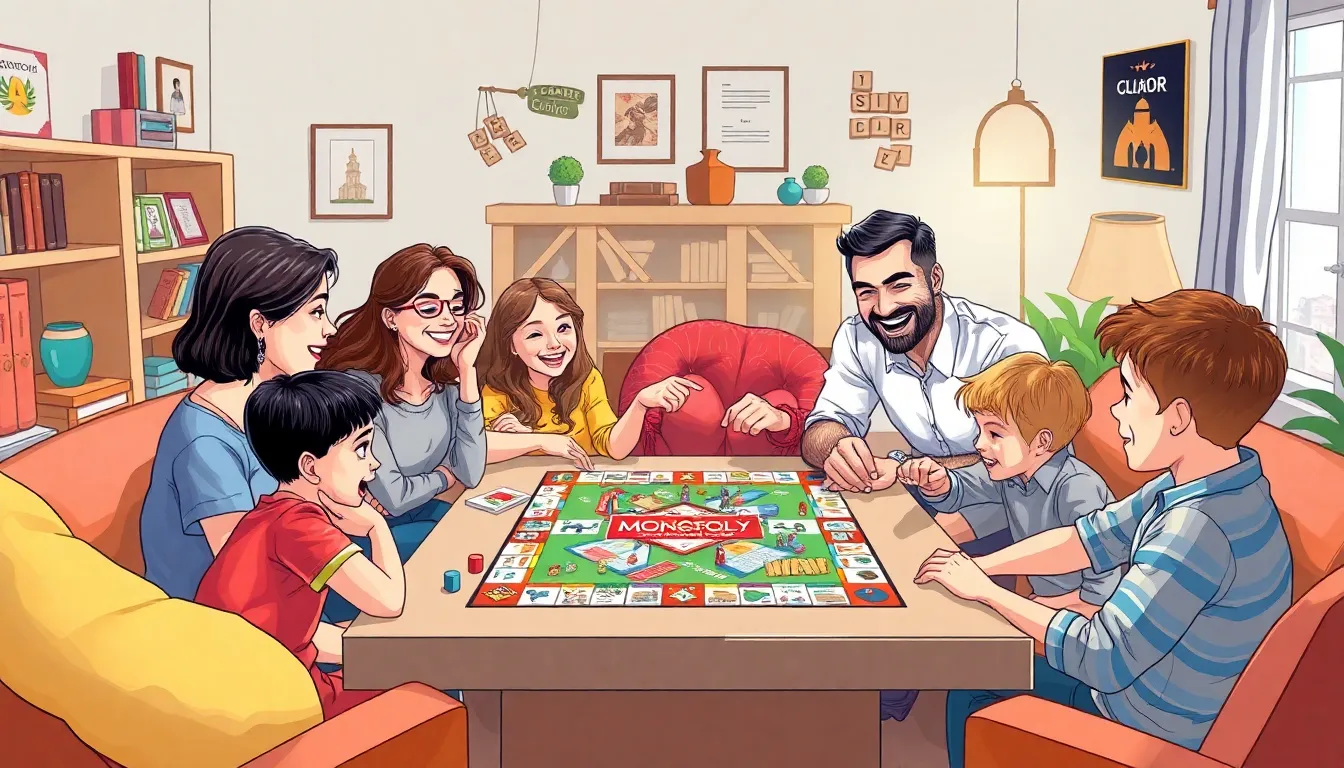Gather ’round the table and dust off those game boxes hiding in the attic! Classic family board games are making a comeback, and they’re not just for rainy days anymore. From Monopoly’s cutthroat property battles to Scrabble’s wordy showdowns, these games offer more than just entertainment—they bring families together for laughter, competition, and maybe a little friendly rivalry.
Table of Contents
ToggleThe Importance of Family Board Games
Family board games play a crucial role in strengthening relationships among family members. They create spaces for teamwork, communication, and problem-solving while fostering connections across generations. Players develop social skills and learn to navigate competition, which enhances their ability to handle wins and losses gracefully.
These games serve as an excellent tool for building memories that last a lifetime. Families enjoy gathering around the table, sharing stories, and laughing together. Moments spent playing games like Monopoly or Scrabble contribute to shared experiences that can be cherished for years.
Engagement in board games also promotes cognitive development. Strategies, critical thinking, and decision-making skills come into play, providing mental stimulation for all ages. Children especially benefit as they learn counting, reading, and strategic thinking in a fun environment.
Moreover, family board games help reduce screen time. With more families turning to technology for entertainment, board games offer a welcome break. Families can unplug and revive traditions centered around face-to-face interaction.
Research supports the impact of family playtime on mental well-being. Engaging in shared activities reduces stress and improves mood. By dedicating time to board games, families nurture positive dynamics that contribute to a supportive home environment.
The importance of family board games extends beyond mere fun. They create opportunities for learning, bonding, and building resilience through shared experiences. Prioritizing these games can enhance the overall family dynamic.
Popular Classic Family Board Games

Classic family board games offer engaging experiences for players of all ages. These games blend entertainment with valuable skills, enhancing family interactions and creating memorable moments.
Monopoly
Monopoly remains a timeless favorite, challenging players to buy, trade, and develop properties. Players navigate a colorful board, making strategic decisions to bankrupt opponents. Competitive spirit thrives as families engage in negotiations and trades. This game fosters financial literacy, teaching budgeting and investment skills in an enjoyable way. Many families turn to Monopoly for evenings filled with laughter and rivalry, proving its lasting appeal.
Scrabble
Scrabble is another classic that captivates word enthusiasts. Players use letter tiles to create words on a game board, scoring points based on word length and placement. Both vocabulary and strategy come into play, promoting critical thinking and problem-solving skills. Families often find joy in friendly competition as they challenge each other’s linguistic abilities. With countless variations and editions available, Scrabble continues to bring families together around the table.
Clue
Clue invites players into a world of mystery and deduction. Players assume the roles of various characters to solve a whodunit scenario in a grand mansion. Collecting clues and making strategic accusations add an exciting, interactive element to gameplay. Skillful deduction encourages teamwork and collaboration, making it a great choice for family game nights. Clue’s engaging premise ensures that players remain captivated as they piece together the puzzle.
Risk
Risk challenges players to conquer the world through strategic military maneuvers. Players engage in battles, forming alliances and making calculated risks to expand their territories. Critical thinking and tactical planning play vital roles in achieving domination. This game encourages patience and perseverance, as players learn from both victories and defeats. Families often enjoy the thrilling challenge of Risk, making it an ideal addition to their classic game collection.
Benefits of Playing Board Games Together
Playing board games together promotes family bonding and creates joyful experiences. Opportunities for laughter emerge as family members engage in friendly competition. Enhanced communication happens naturally as players discuss strategies and decisions. Teamwork improves with players collaborating to achieve common goals in cooperative games.
Cognitive skills also receive a boost. Critical thinking develops when children and adults alike navigate complex rules and devise strategies. Problem-solving becomes a shared activity, where everyone hones their ability to make decisions under pressure.
Reducing screen time becomes achievable as families choose board games over digital media. Face-to-face interactions foster deeper connections and understanding among family members. Research shows that shared playtime can alleviate stress and enhance mood. A supportive home environment contributes significantly to better mental health.
Strengthening relationships occurs across generations. Younger and older family members engage with each other, sharing knowledge and experiences. Lasting memories form during game nights filled with excitement and conversation. Players often reminisce about fun moments long after the game ends.
Classic family board games serve as tools for learning and development. Games like Monopoly teach financial literacy and strategic thinking. Scrabble expands vocabulary and promotes language skills, while Clue enhances deduction capabilities. Risk encourages strategic thinking and instills patience and perseverance.
All these factors contribute to a greater appreciation for the time spent together. Prioritizing board games ensures that families cultivate resilience and foster a strong bond.
Tips for Family Game Night
Establish a designated game night each week to build anticipation for family gatherings. Families benefit from selecting a variety of classic board games to cater to different interests. Rotate game choices to ensure everyone has an opportunity to play their favorites, creating excitement around each game night.
Set the tone with comfortable seating and snacks to enhance the overall experience. Encouraging open communication during gameplay promotes teamwork and bonding among family members. Players should engage in friendly competition, which adds a dynamic element to the experience.
Establishing clear rules before gameplay minimizes confusion and enhances enjoyment. Some families might enjoy creating custom house rules to personalize the experience further. Avoid distractions, such as phones or television, to maintain focus on each other and the game.
Emphasizing collaboration instead of just competition can strengthen connections. Consider cooperative board games that require players to work together toward a common goal. Scheduling breaks during longer game sessions keeps energy levels high and allows for sharing stories or experiences.
Track scores for a friendly rivalry, but prioritize fun over winning. Celebrate successes together, no matter how small, reinforcing positive interactions. Use game nights as an opportunity to teach valuable life skills, like patience, strategic thinking, and problem-solving.
By implementing these simple tips, families can transform game night into an engaging and enriching experience that cultivates lasting memories and nurtures relationships across generations.
Classic family board games play a vital role in nurturing connections and creating cherished memories. They offer a perfect blend of fun and learning while encouraging teamwork and communication among family members. By engaging in these timeless games, families can enjoy quality time together, away from screens and distractions.
The laughter and friendly competition foster a supportive environment that enhances relationships across generations. As families gather around the game board, they not only share experiences but also develop essential skills that contribute to personal growth. Prioritizing these game nights can lead to a more cohesive family unit, filled with resilience and joy. Embracing the tradition of board games is a simple yet powerful way to strengthen family bonds and create lasting memories.




